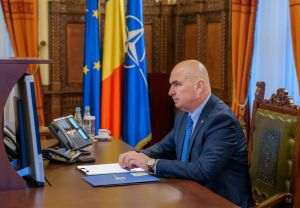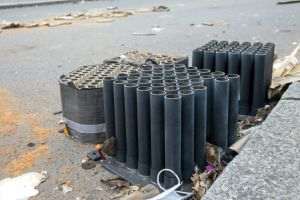Shocked beyond belief that Mişu Negriţoiu, the president of the Financial Oversight Authority (ASF) is not issuing a response to the accusations being made against him, namely that in 2003 and 2004 (when he was executive director of ING Wholesale Banking România - the old name of ING bank) he violated the US embargo against Iran, the people of Realitatea TV were exclaiming yesterday "Look! It's been one whole hour and Mişu is still keeping mum!"
The accusations are based on a document supplied by the US Treasury, which is found on its website, which provides details on "the Iran affair", through which ING Bank România performed operations for Iranian customers, thus violating the embargo imposed by the United States.
That very document, "BURSA" published in a facsimile with comments one year ago (see the online editions of April 2nd, 2014 and of March 31st, 2014), a problem which was the subject of the questions addressed to him by the Parliamentary commissions, on the date when Mişu Negriţoiu was appointed the head of the ASF.
At the time, Mişu Negriţoiu denied, before the members of the Parliament, his involvement in ING Bank România performing banking operations for Iranian clients, thus violating the embargo imposed by the United States, and claimed that it didn't happen during his term.
During the hearings for the position of president of the Financial Oversight Authority (ASF): "In Romania there has been one case which did not occur during my term, I wasn't the one who processed it. The mistake lies with the one who executed the letter of credit, for not asking ten times who the end user was. I had no connection with that".
It wasn't clear what term he was referring to at the time.
We do not dispute the usefulness of additional clarifications on this subject. What is shocking to us is how our "colleagues" are putting canned food on the table claiming it is fresh.
It doesn't seem to have an expiration date, though.
The "Iran" affair
According to the deal concluded by ING Groep with the American authorities, a document which is available on the website of the US Treasury, in November 2003, Tejarat Bank of Iran issued a letter of credit of 1.55 million dollars, in the name of Iran Air, to finance the acquisition of an aircraft engine from a Romanian company, specializing in trade.
The letter of credit required the existence of a certificate of origin which would indicate that the engine originated from the USA and stated that the engine would be shipped to Tehran via Germany, the document states.
That same month, the Romanian company contacted ING România to transfer the letter of credit to "the American partner", according to the quoted source.
The Tejarat bank then made the necessary changes for the letter of credit to be transferable, namely, it removed every reference to Iran and concealed the origin of the assets, the US Treasury said.
In February 2004, ING Romania transferred the letter of credit to the American exporter, the quoted source further said.
In March the same year, an American bank noticed a discrepancy in the letter of credit and informed ING Romania that it was not authorized to make the requested payment, after the Amsterdam office of the Dutch bank was contacted, to ensure the resolution of the problem, the agreement notes. The American bank asked for the name of the issuing bank to be revealed, but an employee of ING Amsterdam advised another not to do that, according to the US Treasury.
After an ING Romania employee informed the American bank that the issuing bank was Tejarat Bank, the American bank informed the US authorities about the transaction.
It is true that at the time, Mişu Negriţoiu wasn't the CEO of ING Bank România, but it would be hard to believe that he didn't know what his subordinates were doing, especially on a "sensitive" matter such as the violation of an embargo.
According to a piece of news by Bloomberg, ING Groep NV struck a deal with the American government in 2012 to pay 619 million dollars following some accusations from the US that it forged financial records to avoid sanctions imposed on countries such as Cuba and Iran.

















































